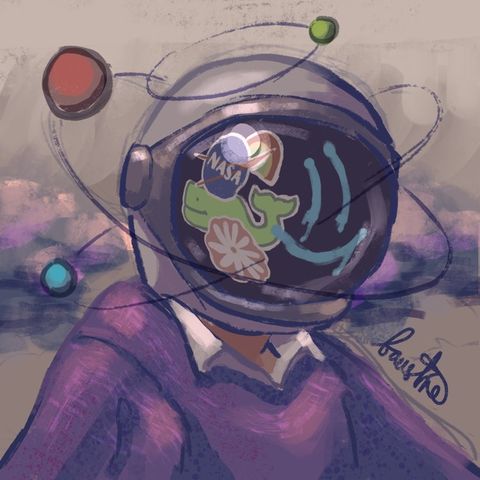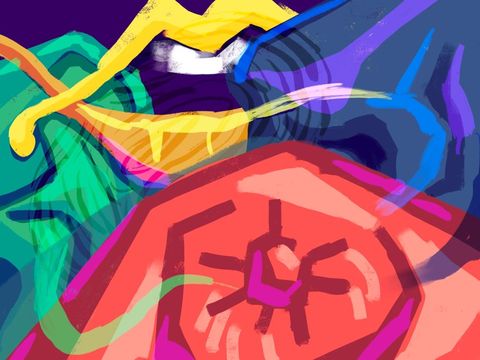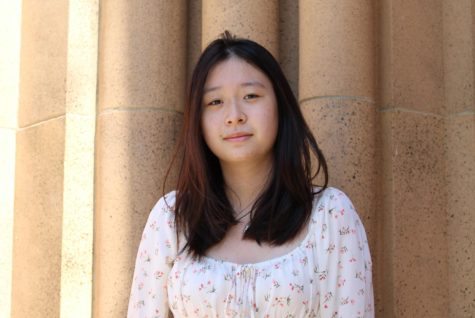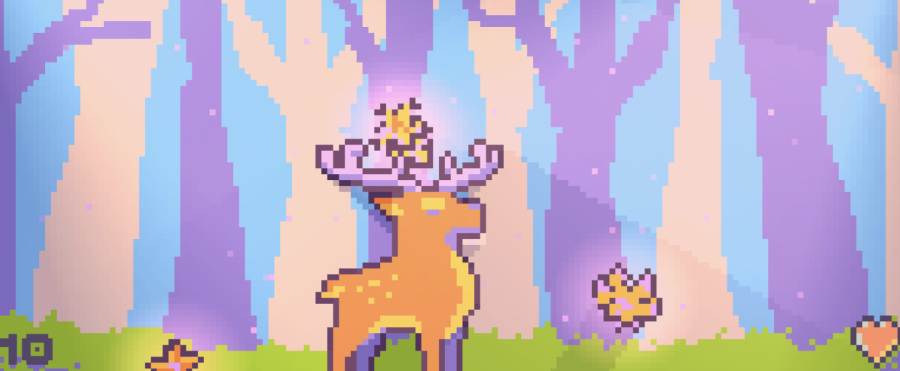Art on the Mind
After Faustine Wang’s game “Bounce Battle,” she has continued intertwining cognitive science and art while designing more games
A game called “Flower Shower” boots up, and a familiar charming 8-bit art style appears. Using the arrow keys and spacebar to control a deer, the deer jumps and catches large flowers, while shaking off insects and avoiding branches. This is one of Paly alumna Faustine Wang’s new games that she created. Since her feature in C Magazine’s March 2021 article, Wang’s relationship with art has naturally progressed.
“I think [my interest] has slightly changed, but generally it’s still the same,” Wang said. “… In a way it’s like a continuity, but I’m [also] discovering new things.”
Art has been a part of the majority of Wang’s life and as such the process has become ingrained into her mind.
“Honestly, at this point [art] is almost like a habit,” Wang said. “[It’s] kind of just something I do. I think that a lot of people might say [art] is like a passion. I describe it more as a habit.”
Creating art has become more personal to Wang. She no longer caves into the pressure to constantly show others what she has drawn.
“In the past, I had the pressure of having to post [art] onto Instagram,” Wang said. “I actually have not posted in a long time but I think it’s okay. I make art for myself now.”
Furthermore, Wang continues to mix her interest in computer science with her talent for design. One aspect of art that ties into Wang’s interest for game design is user experience, or the focus on a users’ feelings when using a product.
“I… recently learned about user experience design, user interface design, and just design in general,” Wang said. “It seems like a very direct way of creating a visual and interacting with your audience.”
In addition to her creations in her freetime, Wang also works as the Art Manager for ACM (Association for Computing Machinery) studio, a game design club.
“We [at ACM studio] have to make sure that we [are] able to create something that is visually pleasing, and also something that helps make a story come alive,” Wang said.
Despite Wang’s dedication and passion for art, she is not studying an art related major. Instead, Wang is majoring in cognitive science at UCLA.
“I ended up going into cognitive science, because it was intellectually interesting to me,” Wang said. “In addition to art, I really like to think about philosophy, psychology and how people think.”
Interestingly, Wang finds that cognitive psychology and art are actually related.
“I’m learning more about how cog sci [cognitive science], design and art meet [at] this one discipline because a lot of people majoring in cog sci actually end up going into user experience and user interface,” Wang said. “By learning how people think and process information, we are able to pay more attention to user-friendly and human oriented design and art.”
Given their relation, Wang views cognitive science as an extension of her art.
“For me, because I like to make art that kind of expresses information and symbols, I can find nuggets of information that I find interesting in cog sci and put them into my art,” Wang said. “Recently, I found the ethical issues and also the implications of artificial intelligence interesting. [Artificial intelligence] is also something that cog sci people like to work on and use to study cognition. So… exploring that through art is interesting as well.”
In 2021, Wang and her friends created Artruism, a nonprofit organization that commissions art for charity. Over the summer they hosted a series of art workshops at an elementary school in Sacramento.
“Being able to bring art into education was very interesting,” Wang said. “I think that art is able to bring good into [our] life,” Wang said.
Though Wang’s main focus in college is not art, she still believes that art is important to the world.
“I think we like to think about art and entertainment as separate from computer science, but in reality, we as humans need art,” Wang said. “[Art] intertwines with a lot of different disciplines which is able to make our world a nicer place to live; I wouldn’t want to live in a bland, purely utilitarian world. Art just creates more soul and spirit.”



Art courtesy of Faustine Wang

2021-2022 - Staff Writer
2022-2023 - Online Managing Editor
C Mag was really appealing to me because of its creativity and beautiful designs. I remember...


